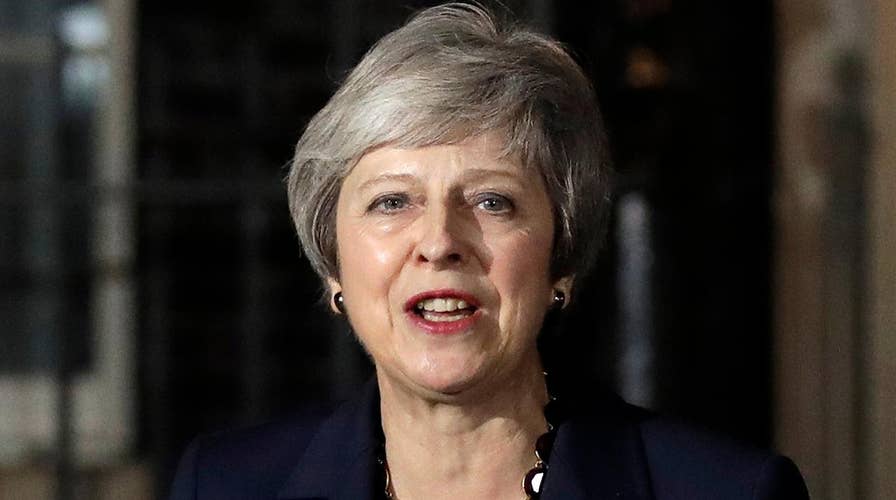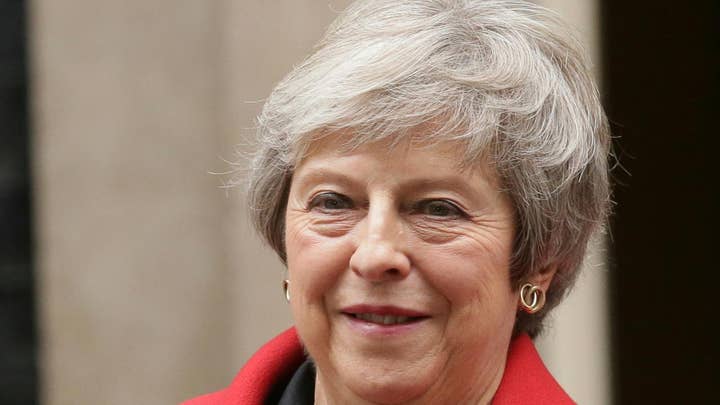May's plan to leave EU met with hostility at Parliament
Brexit draft agreement sets the stage for a battle in the U.K. prime minister's Conservative Party; Greg Palkot breaks down the details from London.
U.K. Prime Minister Theresa May was fighting for her political survival on Thursday after a draft Brexit agreement with the European Union sparked resignations from her Cabinet -- and left furious opponents from within her own party pushing for a change in leadership.
Brexit Secretary Dominic Raab and Work and Pensions Secretary Esther McVey were the two most high-profile resignations that came a day after May presented her deal to Cabinet on Wednesday.
The resignations signal a new crisis for May -- who has struggled to hold onto power as prime minister and leader of the Conservative Party in the face of widespread criticism as to how she has handled Britain’s departure from the European Union.
That pressure continued in the House of Commons Thursday, where May defended the deal in the face of anger from both opposition and Tory backbenchers.
“The choice is clear: we can choose to leave with no deal, we can risk no Brexit at all or we can choose to unite and support the best deal that can be negotiated,” she told the Commons.
She later made her case again at a press conference where she urged her party to rally around the deal. She said she was sorry others had chosen to leave the government, and didn't judge them harshly for doing so.
MOST UK FIRMS TO TRIGGER BREXIT SAFETY PLANS 'BY CHRISTMAS'
"But I believe with every fiber of my being that the course I have set out is the right one for our country and all our people," she said, adding that the alternative was a "path of deep and grave uncertainty."
She also laid out where she believes the deal, concerning the relationship between the E.U. and the U.K. after the U.K. leaves the bloc in March 2019, delivers on the 2016 referendum -- particularly on returning control of U.K. borders to London by stopping the free movement of people, ending the jurisdiction of the European Court of Justice (ECJ), and pulling out of controversial agreements such as the Common Agricultural Policy (CAP) and the Common Fisheries Policy (CFP.)
"This is exactly what this agreement will deliver. Free movement: ended. Vast annual payments: stopped. Jurisdiction of the ECJ: over. Out of the CAP, out of the CFP. This is a Brexit that delivers on the priorities of the British people," she said.
Much of the controversy surrounding the deal has focused on a “backstop” clause that would keep the U.K. in a customs union in case an additional trade deal is not forged. The backstop has been deemed necessary to make sure that there isn’t a hard border between Northern Ireland and Ireland, which is remaining in the E.U. Opponents fear that it would be a backdoor way of keeping Britain in the E.U. permanently, dubbed a “Hotel California” Brexit -- a reference to the Eagles hit, which describes a hotel you can check out of “any time you like,” but you can never leave.
In his resignation letter, Raab told May that it would give the E.U. a “veto over our ability to exit.”
MAY SAYS UK CABINET BACKS BREXIT DEAL AMID WIDE OPPOSITION
“No democratic nation has ever signed up to be bound by such an extensive regime, imposed externally without any democratic control over the laws to be applied, nor the ability to decide to exit the arrangement,” he wrote.
While May announced late Wednesday that Cabinet supported her deal, she admitted the debate was “impassioned.” The resignations suggest that it is deeply split, which bodes poorly for the deal's chances in Parliament.
In the Commons on Thursday, May faced criticism from the opposition Labour Party -- where left-wing leader Jeremy Corbyn lambasted the “half-baked” deal.
“This is not the deal the country was promised, And Parliament cannot and I believe will not accept a false choice between this bad deal and no deal,” he said.
The voices from her own party offering muted support were drowned out by fierce criticism from backbenchers who expressed concern about the deal, and openly questioned whether May was fit to continue leading the party.
In a speech that drew gasps from the chamber, Jacob Rees-Mogg MP -- who has become the de facto leader of the “hard Brexit” wing of the party -- warned Thursday morning that he might write to Graham Brady MP, the leader of the party’s 1922 committee, to call for May to face a vote of no-confidence. Should Brady receive 48 letters from disgruntled Tory MPs, it would trigger a vote of no-confidence against May as party leader, and consequently as prime minister.
“My Right Honorable Friend, and she is unquestionably honorable, said that we would leave the customs union. annex 2 says otherwise," Rees-Mogg said in the Commons, challenging how May had presented the deal. "My Right Honorable Friend said that she would maintain the integrity of the United Kingdom, a whole protocol says otherwise. My Right Honorable Friend says that we would be out of the jurisdiction of the European Court of Justice -- Article 174 says otherwise. As what my Right Honorable Friend says and what my Right Honorable Friend does no longer match, should I not write to [Brady?]”
Rees-Mogg later sent the letter and said that there were “streams of talent” within the party who could replace May, listing off a number of possible candidates. He did not put his own name forward, although he is frequently named as a possible candidate for the job. It was not clear how many letters Brady had received by Thursday afternoon, but there was no announcement of a no-confidence vote.
Even if May hangs on, the deal looks unlikely to get approved by Parliament, considering the opposition from both Tory and Labour MPs. Should the deal be voted down, that would fuel calls for May’s resignation, as well as calls from Labour MPs for a general election.


